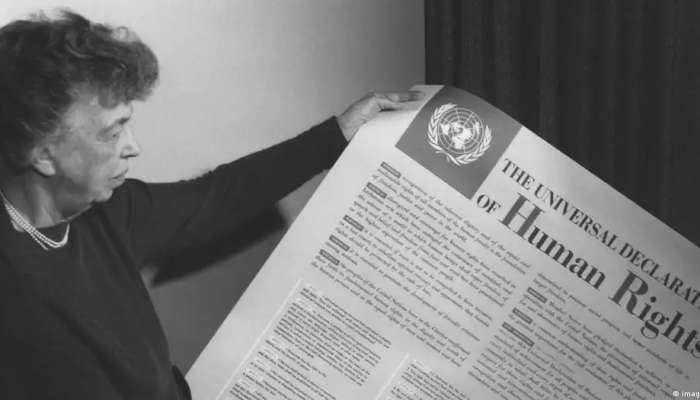
Geneva: When German Foreign Minister Annalena Baerbock went to China earlier this year, she admonished her Chinese counterpart for his country's treatment of the Uyghur Muslim minority.
Qin Gang did not take the comment kindly, replying that China did not need "a teacher from the West." He rejected the notion that there are "universal standards" to protect human rights. Baerbock pointed to the United Nations Universal Declaration of Human Rights (UDHR).
The UN General Assembly adopted the document on December 10, 1948.
Now, Baerbock has warned of the threat posed to the principles enshrined in that document, which is why "universal human rights are more important than ever," she told a gathering of her Green Party's lawmakers marking the anniversary. She opposed the position that "human rights were for fair-weather politics that are only important when there are no other problems."
The declaration, which came into force just three years after the devastation of the Second World War, sums up its intentions in its first article: "All human beings are born free and equal in dignity and rights."
What may seem like an obvious statement was considered a significant breakthrough in global cooperation. For Baerbock, the document forms the basis of German foreign policy 75 years later.
Despite the many challenges to it, from the Middle East to Ukraine to Sudan, the UN High Commissioner for Human Rights, saw reason to celebrate the anniversary.
"The Universal Declaration of Human Rights is a miraculous text," Volker Türk, the commissioner, said in a statement. "At a time when the world emerged from cataclysmic events, the Declaration set out universal rights and recognized the equal worth of every person."
Today's threats
"Even as the 30 articles of the Declaration have sparked a transformation in all areas of our lives," Türk added, "the embers of racism, misogyny, inequality and hatred continue to threaten our world."
The UN estimates that there are now 110 million refugees in the world and 735 million people without enough food to each. Fifty million people are in slavery, according to the International Labor Organization (ILO).
In all, the situation paints a grim picture that "would have dramatically blown up my worst-case scenario ten years ago," Heiner Bielefeldt, a professor of human rights at the University of Erlangen in the southern German state of Bavaria, told DW.
"There have not only been setbacks but outright collapses, both thanks to the advance of autocratic regimes as well as the autocratic tendencies within established democracies," he said.
Despite the poor grade for human rights enforcement, Bielefeldt noted some progress, such as the arrest warrant issued for Russian President Vladimir Putin by the International Criminal Court. Russia, however, does not recognize the court, and Putin is unlikely to face justice there for his invasion of Ukraine.
Germany's human rights standing has also taken a hit. International monitors have downgraded the country's standing from "open" to "hampered," due to the state's treatment of climate activists.
On the international level, however, Germany sees itself as a champion of human rights. Bielefeldt pointed to using German courts, under the principle of universal jurisdiction, to try perpetrators of torture in Syria. It was the first of its kind.
In January last year, the court sentenced the main defendant to life imprisonment for crimes against humanity, 27 counts of murder, rape and deprivation of liberty.
At the Greens' gathering, Baerbock acknowledged the diplomatic challenge of balancing engagement with accountability when it comes to countries with poor records on human rights. Given the number of crises confronting the international community, Bielefeldt said getting that balance right will remain a significant challenge for policymakers.
"It's no longer just about human rights violations here and there, or breaches of international humanitarian law, but about the fact that an entire set of international rules, developed over decades, is in danger of being destroyed," he said.